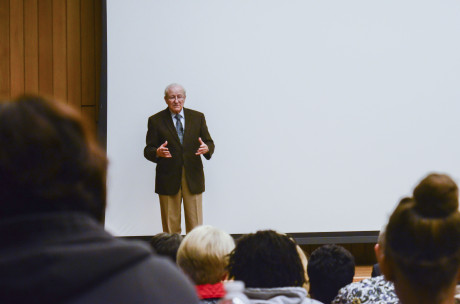
On Monday night, Holocaust survivor and special guest lecturer Irving Roth related to the assembled audience in Chapman Auditorium the story of his survival in the camps of Auschwitz and Buchenwald and the important lessons he learned from his experiences.
Roth came to campus by the with Christians United for Israel, a group that aims to prepare Christian leaders to speak up on behalf of Israel and the Jewish people.
The first part of Roth’s lecture included an account of Kristallnacht on Nov. 9, 1938, and a brief history of the National Socialist Party of Germany.
“75 years ago today, the embers of the 650 synagogues in Germany were still up, and Jewish life in Europe on that night was transformed,” Roth said. “The world was told, “˜not only have we passed laws against the Jews, we can take 30,000 Jews and put them in concentration camps with no cause at all, just because they’re Jewish.’ The Jews that night stopped being citizens.”
Throughout the rest of the lecture, Roth intertwined his own personal experiences with events that were occurring around Europe.
“Roth did a good job of showing his personal aspect and particular story in comparison to the history that was occurring elsewhere,” said sophomore Megan McLoughlin. “He also did a good job describing the transition to Nazi Germany and the subtle changes that started to impact his life before he was even in the concentration camp.”
Roth was born in 1929 in a small town of 7,000 people in Czechoslovakia, where about one-third of the population was Jewish. Roth began to notice changes in the town’s attitudes towards Jewish people at the age of 10 years old.
“I get up in the morning of summer 1939 and I want to play with my friends, but I get to the park and there’s a sign that reads “˜Jews and dogs are forbidden to enter,'” Roth said. “Step by step, I can’t go out at night, and I have to wear a yellow star if I go outside. By the winter of 1939, I’m told I can no longer wear my sheepskin fur because that’s a luxury and Jews can’t wear luxury items. In September 1940, I get up in the morning and I’m almost at the gate to school and the principal looks at me and says, “˜You can’t go in, we don’t allow Jews now.'”
After being rounded up and stuck in a small synagogue with no bathrooms for three months, Roth and his family, which included his brother, his parents and his grandparents, escaped to Hungary. However, in the spring of 1944, Roth and his family were once again rounded up.
“Adolf Eichmann is dispatched to Budapest, organized the Hungarian police, and in 53 days 437,000 Jews, including me, are in cattle cars arriving in Auschwitz,” Roth said. “When the train stops, I’ve been in this cattle car for three days and three nights. One guard looks at me for an instant and says, “˜You, left.’ 24 hours after I arrive with 4,000 other people, 300 are still alive””the others were ashes.”
Yet in January 1945, with the Russian army 50 miles away from Auschwitz, Roth and thousands of other prisoners were taken on a death march to another concentration camp named Buchenwald.
“I am all alone””I am 15 years old and getting skinnier by the day. After all, it is already March of 1945,” Roth said. “And the death marches begin again, and I can’t march. I can hardly walk.”
However, on April 11, 1945, two American soldiers entered Buchenwald, and Roth became a free person once again. Upon returning to his home, Roth found out that his parents had also survived the Holocaust.
Senior Brenda Lira enjoyed listening to Roth, but she thought he glossed over his personal tale of survival.
“I thought it was good, but I do wish that Roth had spoken a little more on his experience because that’s what I was looking for, but it was more of a side note in the whole scheme of things,” Lira said. “I wish he had gone into a little more detail on what it was like being a survivor of something so dark, but I feel that he kind of danced over that a little.”






